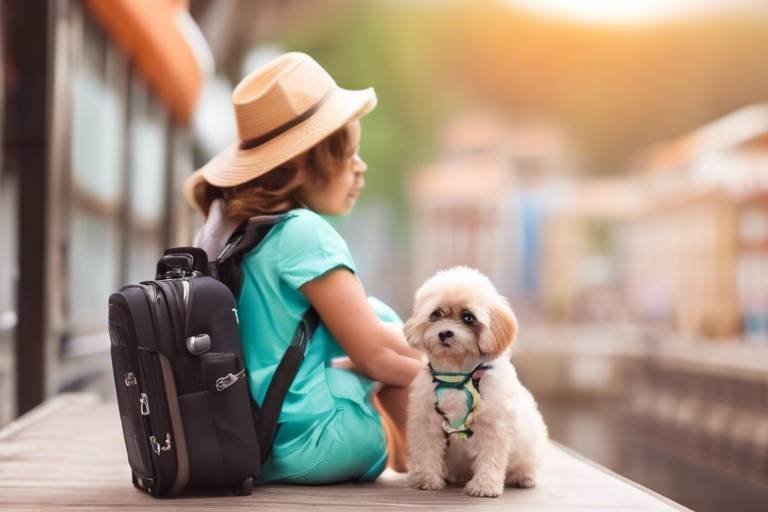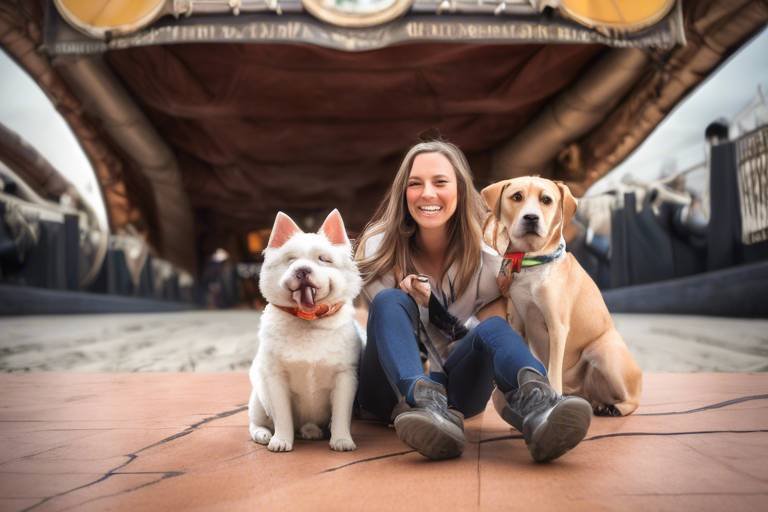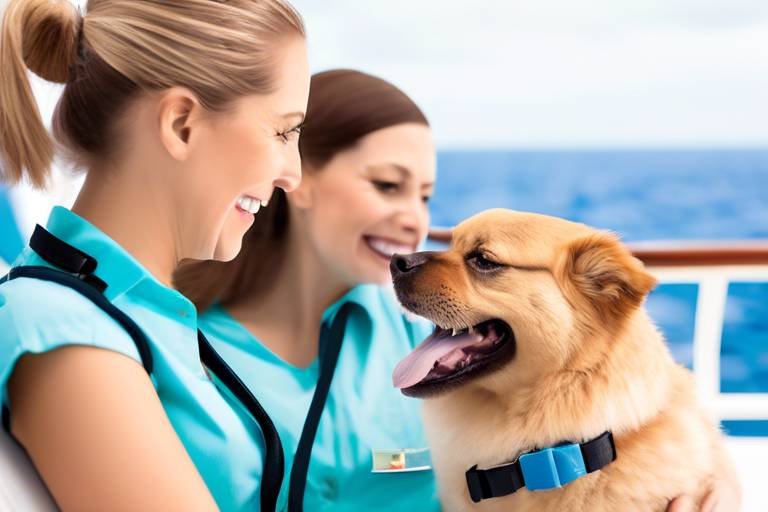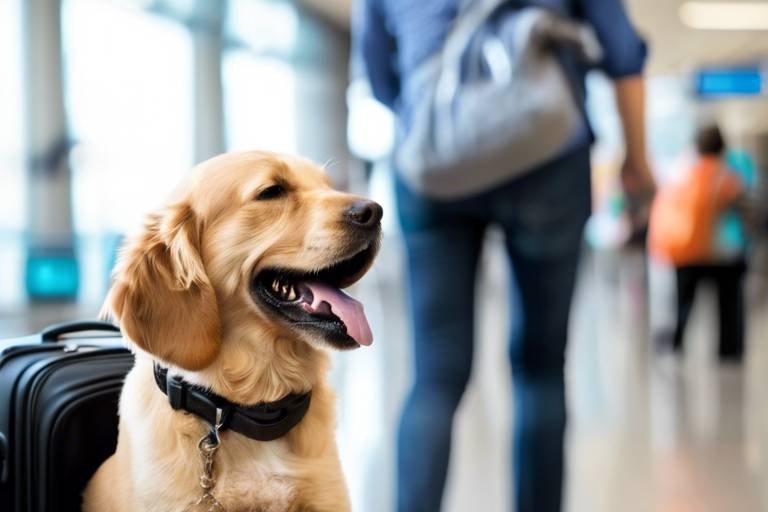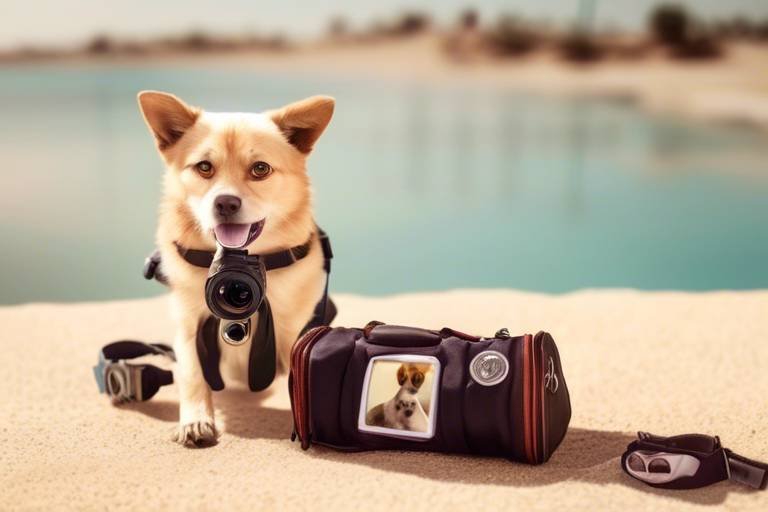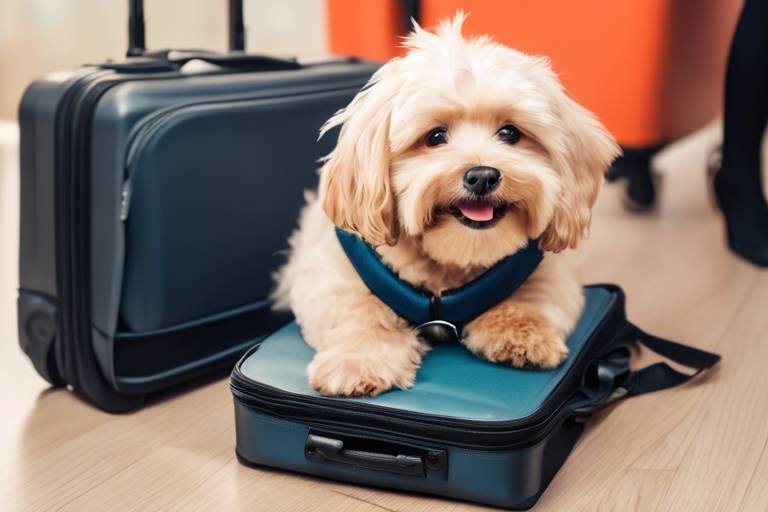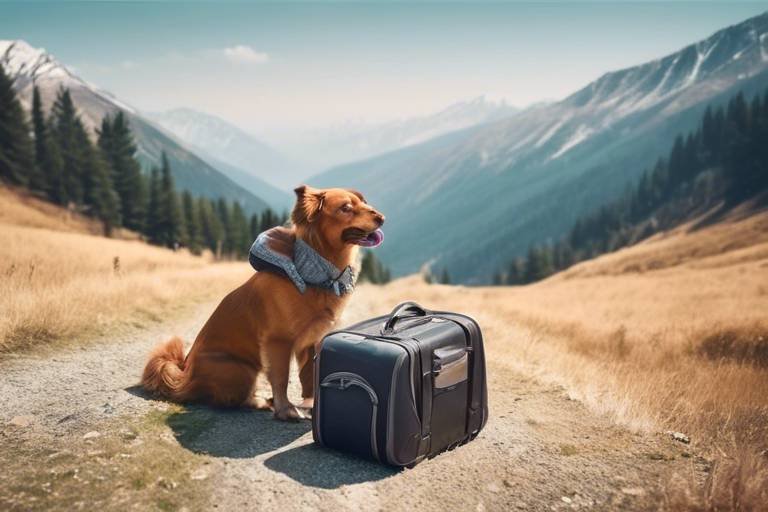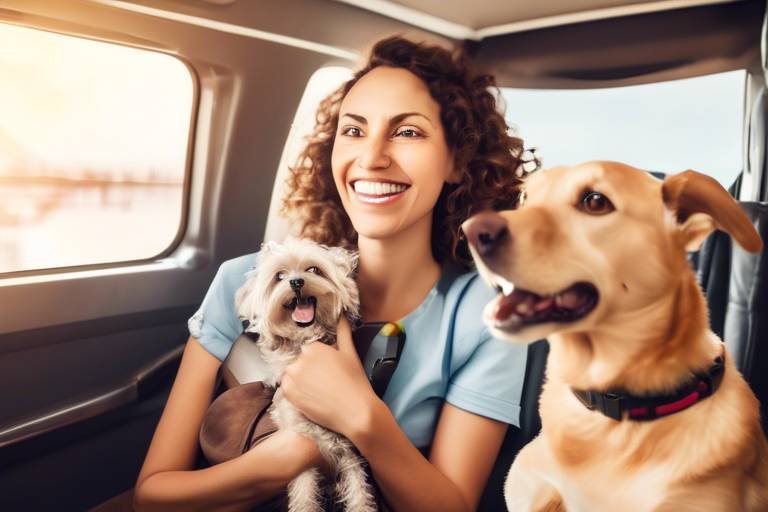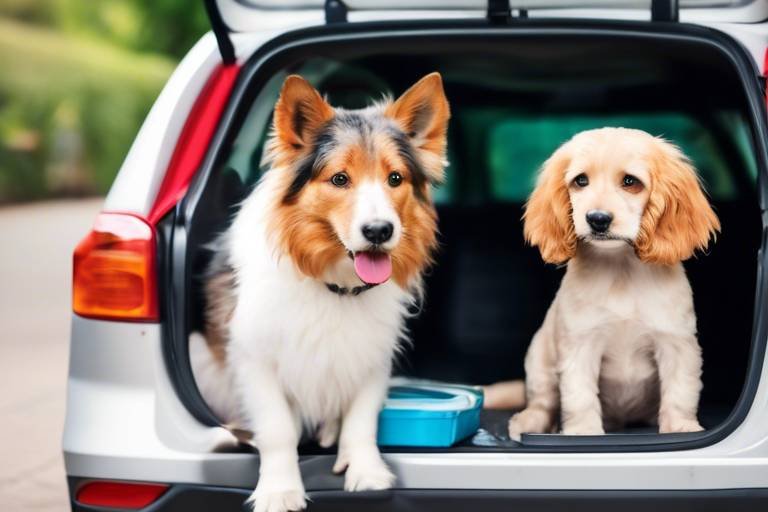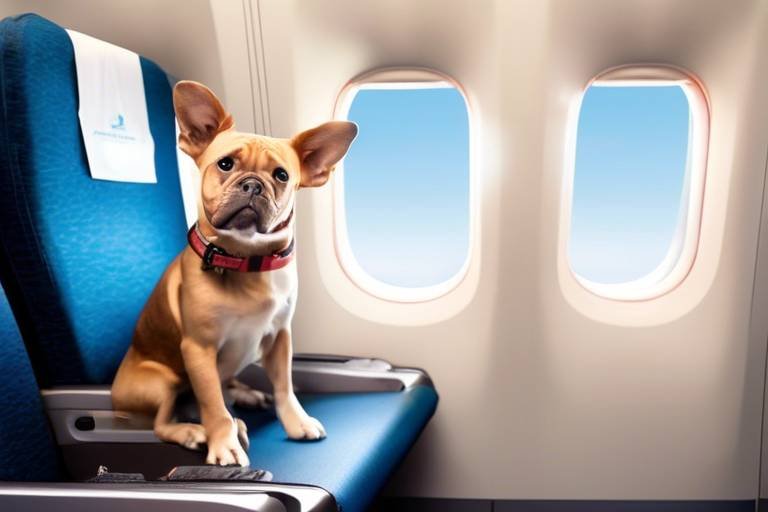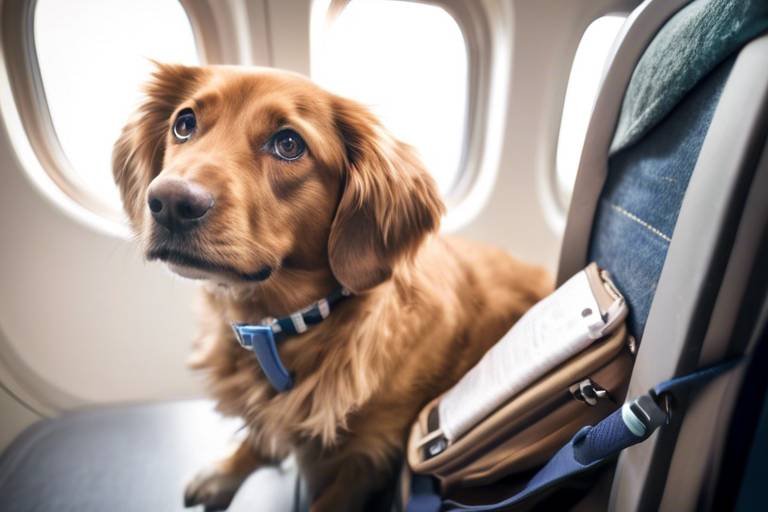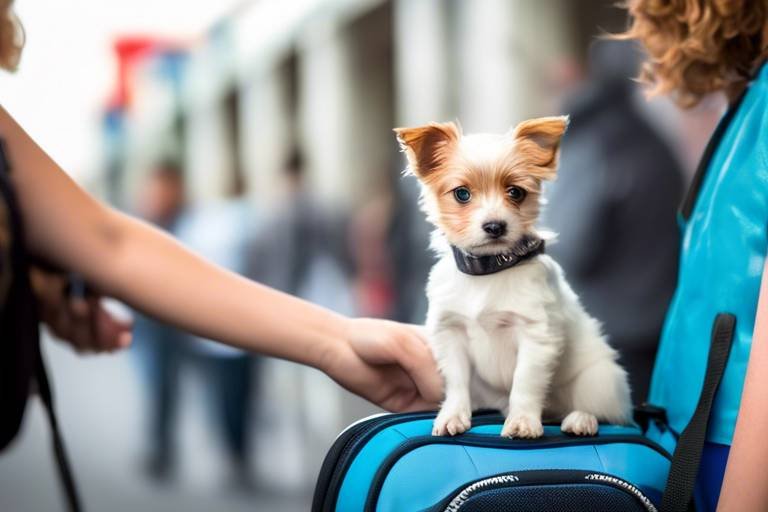How to Create a Pet-Friendly Travel Budget
Traveling with your furry companions can be one of the most rewarding experiences, but it also requires a little extra planning and budgeting. Just like you wouldn't embark on a road trip without a full tank of gas, you shouldn't set off on an adventure with your pets without a solid travel budget. In this article, we’ll dive deep into the essential tips for budgeting travel expenses while ensuring your pets are well taken care of. Whether you’re heading to the beach, the mountains, or just a weekend getaway, learning how to plan a cost-effective and enjoyable trip for both you and your furry friends is crucial.
Imagine this: you’re driving down a scenic highway, your favorite tunes playing, and your dog happily sticking its head out the window. That’s the dream, right? But before you can reach that blissful moment, you need to tackle the nitty-gritty of travel budgeting. So, let’s break it down step by step. We’ll explore everything from understanding pet travel costs to choosing the right accommodations, and even how to prepare for unexpected expenses. By the end, you’ll be ready to hit the road with your pets without breaking the bank!
Before hitting the road, it's crucial to understand the various costs associated with traveling with pets. This section will help you identify and estimate these expenses for a smoother budgeting process. First off, consider the basics: transportation, accommodation, food, and supplies. Each of these categories can vary significantly depending on your destination and the needs of your pet. For instance, if you’re flying, you may need to pay for a pet carrier and possibly an airline fee. On the other hand, if you’re driving, you might need to factor in extra stops for bathroom breaks or meals for your pet.
Here’s a quick breakdown of potential costs:
| Cost Category | Estimated Cost |
|---|---|
| Pet Carrier (if flying) | $30 - $150 |
| Pet Fees (hotels) | $10 - $50 per night |
| Food and Supplies | $20 - $100 (depending on duration) |
| Emergency Fund | $100 - $500 (recommended) |
By understanding these costs upfront, you can create a budget that covers all the essentials without any nasty surprises. It’s all about planning ahead and making informed decisions!
Finding the right place to stay is key to a successful pet-friendly trip. Not all accommodations are created equal, and some may charge hefty fees for your furry friends. Explore various accommodation options that welcome pets and how they impact your travel budget. Hotels, motels, and vacation rentals each offer different experiences and price points. You’ll want to consider not just the cost but also the amenities and policies regarding pets.
When it comes to choosing between hotels and vacation rentals, each option has its own set of costs and benefits that can affect your budget. Hotels often provide a more structured environment, while vacation rentals can offer more space and a homier feel. Think about what’s best for you and your pet. For instance:
- Hotels: Typically have pet policies and may charge extra fees.
- Vacation Rentals: Often allow pets without additional fees but may require a larger upfront cost.
Many accommodations charge additional fees for pets. Understanding these costs and how to factor them into your overall travel budget is essential to avoid surprises. Some places may have a one-time cleaning fee, while others might charge a nightly rate for your pet. Always read the fine print and ask about any hidden fees.
Some accommodations offer special amenities for pets, such as dog parks, pet beds, or even treats at check-in. Discover which features can enhance your stay and whether they justify any additional expenses. Sometimes, spending a little more for a pet-friendly hotel with these perks can make your trip much more enjoyable!
Traveling with pets often involves unique transportation costs. Learn about various options, including car travel and public transportation, and how they can affect your budget. If you're driving, consider the cost of gas, food for yourself and your pet, and any pet-friendly stops along the way. For public transport, check the pet policies, as some may require pets to be in carriers or may have additional fees.
Planning for your pet's food and supplies is essential. This section outlines how to budget for meals, treats, and necessary items during your trip. Don’t forget to account for your pet's dietary needs and preferences, as well as any special treats that might make the journey more enjoyable for them.
Consider preparing your pet's food before the trip to save money and ensure they have familiar meals. Learn tips for packing and storing pet food efficiently. Using airtight containers can keep food fresh and prevent spills during travel.
Identify the essential supplies you'll need for your pet while traveling. This guide will help you avoid last-minute purchases that can strain your budget. Don't forget items like leashes, bowls, toys, and any necessary medications. Packing these in advance can save you both time and money.
Unexpected situations can arise while traveling. Establishing an emergency fund specifically for your pet can provide peace of mind and financial security during your trip. This fund can cover unexpected vet visits, medications, or even pet boarding if you need to make an unplanned stop.
Understanding potential veterinary costs while traveling can help you prepare for emergencies. Learn how to budget for unexpected vet visits and medications. It’s wise to research local veterinarians at your destination in case you need to seek care.
Explore the benefits of having pet insurance while traveling. This section discusses how insurance can mitigate costs related to accidents or health issues on the road. Having insurance can provide peace of mind, knowing that you’re covered in case of an emergency.
As you prepare for your journey, you might have some lingering questions. Here are a few frequently asked questions to help guide your planning:
- Can I take my pet on a plane? Yes, most airlines allow pets, but you'll need to check their specific policies.
- What should I do if my pet gets sick while traveling? Always have a list of local vets handy and keep your pet's medical records accessible.
- Are there pet-friendly restaurants? Many places now offer pet-friendly dining options, so look for those in your destination.
With a little forethought and planning, you can create a pet-friendly travel budget that allows you to enjoy your adventures together without financial worries. Happy travels!

Understanding Pet Travel Costs
Before you pack your bags and grab the leash, it's essential to get a grip on the various costs that come with traveling with your furry companions. Traveling with pets can be a delightful adventure, but it can also come with its own unique set of expenses. From accommodations to food and even emergency vet visits, understanding these costs will help you create a budget that ensures a smooth and enjoyable trip for both you and your pets.
First off, let's talk about the main categories of expenses you should consider. These include:
- Accommodation Costs: Many hotels and vacation rentals charge extra fees for pets. It's crucial to check their pet policies beforehand to avoid any surprises.
- Transportation Expenses: Whether you're driving or flying, transporting your pet can involve additional costs, such as pet carriers, gas, or even pet-friendly airline fees.
- Food and Supplies: You’ll need to budget for your pet's meals, treats, and any supplies like leashes, bowls, or litter that you might need on the road.
- Emergency Fund: Unexpected situations can arise, and having an emergency fund specifically for your pet can provide peace of mind.
To give you a clearer picture, here's a simple breakdown of potential costs you might encounter:
| Expense Category | Estimated Cost |
|---|---|
| Accommodation Pet Fees | $25 - $100 per night |
| Transportation (Gas, Airlines) | $50 - $300 |
| Food and Supplies | $30 - $100 |
| Emergency Fund | $100 - $500 |
By having a clear understanding of these costs, you can plan better and avoid any financial surprises that could derail your fun. Imagine arriving at your destination only to find out that your hotel charges a hefty pet fee that you hadn't budgeted for. Or worse, needing to find a vet unexpectedly and not having the funds set aside for it. So, take a moment to jot down these potential expenses and factor them into your travel budget.
In addition to these costs, consider the emotional and physical needs of your pet. Traveling can be stressful for them, and ensuring their comfort should also be a part of your budgeting process. Whether it's investing in a cozy pet carrier or planning for extra stops during a long drive, these considerations can enhance your travel experience.
So, as you start planning your pet-friendly getaway, keep these costs in mind. A well-prepared budget not only saves you money but also allows you to focus on creating unforgettable memories with your furry friends.

Choosing Pet-Friendly Accommodations
When it comes to planning a trip with your furry companions, one of the most crucial aspects is finding the right place to stay. After all, your pet's comfort and safety are just as important as your own. Imagine arriving at your destination, only to discover that your hotel doesn’t allow pets or charges exorbitant fees. That’s a recipe for a travel disaster! So, how do you navigate the maze of pet-friendly accommodations and ensure a smooth stay for both you and your four-legged friend? Let's dive into the nitty-gritty of choosing the ideal spot for your adventure.
First off, it’s essential to understand that not all accommodations labeled as "pet-friendly" are created equal. Some might have restrictions on the size or breed of pets, while others may only allow pets in certain areas. To avoid any unpleasant surprises, do your homework before booking. Look for accommodations that explicitly state their pet policies, and don’t hesitate to reach out to them directly with any questions. This proactive approach can save you from potential headaches later on.
Next, consider your options. There are typically two main types of accommodations to choose from: hotels and vacation rentals. Each has its unique pros and cons, and your choice can significantly impact your travel budget. For instance, hotels often provide amenities like room service and cleaning, but they may charge additional pet fees. On the other hand, vacation rentals can offer more space and a home-like environment, which can be particularly beneficial for larger pets or multiple animals. However, some vacation rentals may require a hefty security deposit, especially if pets are involved.
When weighing the options between hotels and vacation rentals, it's crucial to consider what fits best for your travel style and your pet's needs. Here’s a quick comparison:
| Criteria | Hotels | Vacation Rentals |
|---|---|---|
| Space | Typically smaller rooms | More spacious, often with separate rooms |
| Pet Fees | Often charge extra fees | May require a deposit or additional cleaning fee |
| Amenities | Room service, cleaning services | Kitchen, laundry facilities |
| Flexibility | Check-in/check-out times | More flexible with timings |
Now, let’s talk about those pesky pet fees and deposits. Many places will charge you an additional fee just for bringing your pet along. These fees can vary widely, from a nominal daily charge to a one-time deposit that can be quite steep. Make sure to factor these costs into your overall travel budget. It’s also worth asking whether the deposit is refundable, as this can significantly influence your decision.
Understanding the financial implications of pet fees is vital. Some accommodations might offer discounts for longer stays or waive the fee during off-peak seasons. Always read the fine print and don’t hesitate to negotiate if you feel it's appropriate. After all, a little conversation can go a long way in saving you some cash!
Lastly, consider the amenities that accommodations offer for pets. Some places go the extra mile by providing dog beds, bowls, and even treats! These perks can enhance your stay and make your pet feel right at home. However, it’s essential to weigh these benefits against any additional costs. For example, if a hotel charges a premium for these amenities but doesn’t offer much else, it might not be worth the extra expense.
In conclusion, choosing the right pet-friendly accommodation can set the tone for your entire trip. By doing thorough research, understanding the fees involved, and considering the amenities offered, you can create a travel experience that’s enjoyable for both you and your pets. Remember, a little planning goes a long way in ensuring that both you and your furry friends have a fantastic time away from home!
- What should I look for in a pet-friendly accommodation? Look for clear pet policies, space for your pet, and amenities that cater to their needs.
- Are pet fees refundable? It depends on the accommodation. Always check their policy regarding pet deposits.
- Can I negotiate pet fees? Yes, it’s worth asking if they can offer a discount, especially for longer stays.
- What if my pet has special needs? Make sure to communicate any special requirements with the accommodation ahead of time.
Hotels vs. Vacation Rentals
When planning a trip with your furry friend, one of the biggest decisions you'll face is whether to stay in a hotel or a vacation rental. Both options have their unique charm and set of advantages, but they also come with different costs and considerations that can impact your travel budget. Let's break it down a bit.
Hotels often provide a more traditional experience, complete with room service and amenities like pools and gyms. Many hotels are now pet-friendly, allowing you to bring your pet along for a small additional fee. However, these fees can vary significantly from one hotel to another, and you might find yourself facing a hefty charge for your pooch. On the flip side, hotels usually offer convenience, with staff available to assist you at all hours, which can be a comforting thought when traveling with pets.
On the other hand, vacation rentals, such as those found on platforms like Airbnb or Vrbo, can provide a more spacious and home-like environment for you and your pet. Imagine having your own kitchen to prepare meals, a backyard for your dog to run around, or even a cozy living room to curl up in after a long day of exploring. While vacation rentals can sometimes be more affordable, especially for longer stays, they may also come with their own set of challenges, such as cleaning fees or security deposits that can add to your overall costs.
Here’s a quick comparison to help you weigh your options:
| Factor | Hotels | Vacation Rentals |
|---|---|---|
| Space | Limited space, typically just a room | More space, often with multiple rooms |
| Pet Fees | Varies, often a flat fee | Can include cleaning fees or deposits |
| Amenities | Room service, pools, gyms | Full kitchen, outdoor space |
| Flexibility | Limited check-in/out times | More flexible check-in/out options |
| Privacy | Shared spaces with other guests | More privacy, typically a standalone unit |
Ultimately, the choice between hotels and vacation rentals boils down to your personal preferences and your pet’s needs. If your pet enjoys a lot of space to roam and you appreciate the comforts of home, a vacation rental might be your best bet. However, if you prefer the convenience and services that come with hotels, then opting for a pet-friendly hotel could be the way to go. Just remember to read the fine print regarding pet policies to avoid any unexpected surprises!
As you weigh these options, think about what will make your trip enjoyable for both you and your pet. After all, a happy pet means a happy travel experience!
Pet Fees and Deposits
When planning a pet-friendly getaway, one of the most important aspects to consider is the associated with your accommodations. These additional costs can vary significantly from one place to another, and understanding them can help you avoid any unwelcome surprises that might derail your budget. Many hotels and vacation rentals charge a non-refundable pet fee to cover potential damages or extra cleaning, and these fees can range from a modest $10 to a hefty $100 per night, depending on the property and its policies.
Moreover, some accommodations require a refundable deposit on top of the pet fee, which is typically held until you check out. This deposit is meant to protect the property against any damages caused by your furry friend during your stay. It's essential to read the fine print before booking, as some places may have strict rules about pet behavior, size limitations, or breed restrictions that could affect your plans.
To give you a clearer picture, here's a simple breakdown of how pet fees and deposits might look at various types of accommodations:
| Accommodation Type | Pet Fee | Refundable Deposit |
|---|---|---|
| Hotels | $25 - $75 per night | $100 - $200 |
| Vacation Rentals | $50 - $100 per stay | $200 - $500 |
| Campgrounds | $10 - $30 per night | N/A |
As you can see, the costs can add up quickly, especially if you're planning an extended stay. This is why it’s crucial to include these expenses in your overall travel budget. Additionally, some places may offer special packages or discounts for pet owners, so it’s worth asking if there are any deals available.
Lastly, don’t forget to check for any additional rules that might apply to pets at your chosen accommodation. For instance, some hotels may only allow pets under a certain weight, while others might have designated pet-friendly areas. Understanding these policies ahead of time not only helps in budgeting but also ensures a smooth and enjoyable experience for both you and your furry companion.
- What is the average pet fee at hotels? The average pet fee can range from $25 to $75 per night.
- Are pet deposits refundable? Yes, most pet deposits are refundable if no damage occurs during your stay.
- Can I negotiate pet fees? It’s worth asking, especially for longer stays, as some establishments may offer discounts.
- What should I do if my pet causes damage? Be honest with the accommodation management and discuss any potential charges.
Amenities for Pets
When planning a trip with your furry companions, it's not just about finding a place to sleep; it's also about ensuring that your pets feel comfortable and happy during your stay. Pet-friendly amenities can significantly enhance your travel experience, making it more enjoyable for both you and your pets. Imagine arriving at your accommodation after a long journey, and instead of a plain, sterile room, you find a cozy space equipped with everything your pet might need. This is where pet amenities come into play, and they can make a world of difference.
Many hotels and vacation rentals offer special features designed to cater to your four-legged friends. These can include dog parks, pet beds, and even food and water bowls ready for use. Some places go the extra mile by providing dog-walking services or pet-sitting options, allowing you to explore the area without worrying about your pet being left alone. Additionally, certain accommodations might have grooming services available, which can be a real lifesaver if your pet tends to get dirty during outdoor adventures.
However, it's essential to weigh the benefits against potential costs. While some amenities come at no extra charge, others may require an additional fee. For instance, a hotel might charge a small fee for providing a pet bed or special treats. To help you navigate these costs, consider creating a comparison table of different accommodations, outlining the amenities they offer and any associated fees. This can help you make an informed decision that aligns with your budget.
| Accommodation Type | Pet Amenities Offered | Additional Fees |
|---|---|---|
| Hotel A | Dog park, pet bed, food bowls | $25 per stay |
| Hotel B | Pet sitting, grooming service | $50 for grooming |
| Vacation Rental C | Outdoor space, dog-friendly furniture | No additional fees |
Another aspect to consider is that some accommodations may provide pet-friendly activities or packages that include local pet-friendly attractions. This could be anything from discounted entry to a nearby dog park to special treats at local pet shops. By doing a little research beforehand, you can find places that not only welcome pets but also cater to their needs, ensuring that your travel experience is as smooth and enjoyable as possible.
In conclusion, pet-friendly amenities can turn an ordinary trip into a memorable adventure for you and your pets. By considering these features when booking your accommodation, you can create a travel experience that feels less like a hassle and more like a fun getaway. After all, your pets are part of the family, and they deserve a vacation just as much as you do!
Q: What should I look for in pet-friendly accommodations?
A: Look for amenities such as pet beds, food bowls, and outdoor spaces. Also, consider any additional fees associated with these services.
Q: Are there any hidden costs when bringing pets to hotels?
A: Yes, some hotels may charge additional fees for pets, including cleaning fees or deposits. It's essential to inquire about these costs when booking.
Q: Can I find accommodations that offer pet-sitting services?
A: Yes, many pet-friendly hotels and vacation rentals offer pet-sitting or dog-walking services, allowing you to enjoy your trip without worrying about your pet's needs.
Transportation Expenses
When it comes to traveling with your furry companions, understanding is crucial. Whether you're planning a road trip or opting for public transport, the costs can add up quickly. Let's break down what you need to consider to ensure your budget remains intact while keeping your pets comfortable.
First off, if you're driving, think about the direct costs associated with your vehicle. This includes fuel, which can fluctuate depending on your route and vehicle efficiency. Make sure to calculate the distance you'll cover and the average fuel cost per gallon. For instance, if you're driving 500 miles with a car that gets 25 miles per gallon, you'll need about 20 gallons of fuel. If gas costs $3 per gallon, you're looking at a $60 expense just for fuel!
But wait, there's more! Don't forget about other expenses that come with road travel. These can include:
- Tolls: Depending on your route, you might encounter toll roads. These can vary widely, so check your route ahead to estimate costs.
- Food Stops: If you're traveling with pets, you might want to stop for meals along the way. Factor in the cost of food for both you and your pets.
- Pet-Friendly Stops: Look for rest areas or parks where you can let your pet stretch their legs. Some places may charge for access or amenities.
Now, if flying is in your travel plans, prepare for a whole different set of expenses. Airlines often charge fees for transporting pets, which can vary significantly. On average, you might expect to pay between $100 to $200 for your pet to travel in the cabin with you. If your pet has to go in cargo, the costs can increase even more, and you should also consider the potential need for a pet carrier that meets airline specifications.
Additionally, booking your flights early can help you snag better rates, especially for pet travel. Some airlines have a limited number of spots available for pets in the cabin, so it’s wise to reserve as soon as you can. And remember, some airlines may have specific requirements, such as a health certificate from your veterinarian, which could add to your overall costs.
Lastly, don’t overlook the importance of pet safety during transportation. Whether you're driving or flying, make sure you have a secure crate or harness for your pet. This not only keeps them safe but can also prevent additional fees if your pet is deemed unmanageable. Investing in a good quality carrier can save you from unexpected costs and ensure your pet travels in comfort.
In summary, when budgeting for transportation expenses, consider all potential costs associated with your travel method. By planning ahead and being aware of the various factors, you can create a travel budget that accommodates both your needs and those of your beloved pets.
Q: What should I do if my pet gets anxious during travel?
A: Consider consulting your vet for advice on calming aids or strategies. Familiar items like toys or blankets can also help soothe your pet.
Q: Are there specific airlines that are more pet-friendly?
A: Yes, some airlines are known for their pet policies. Research and read reviews to find the best options for traveling with pets.
Q: How can I save on pet travel expenses?
A: Consider driving instead of flying, as it can often be cheaper. Also, pack your pet's food and supplies to avoid buying them at inflated prices on the road.

Food and Supplies Budgeting
When it comes to traveling with your furry companions, one of the most critical aspects is planning for their food and supplies. Just like you wouldn’t head out on a trip without packing your essentials, your pets deserve the same level of consideration. So, how do you ensure your budget accommodates their needs without breaking the bank? It’s all about preparation and foresight!
First off, consider your pet's dietary requirements. If your pet is used to a specific brand or type of food, it’s wise to stock up on it before your trip. This not only saves you money but also keeps your pet comfortable with familiar meals. Preparing pet food in advance can significantly cut down on costs. For instance, buying in bulk can often lead to discounts. You might also want to check if local stores at your destination offer the same prices or if they charge a premium. Imagine arriving in a new town and discovering that your pet's food costs double what you usually pay! That’s a budget buster you don’t want to deal with.
When planning your food budget, don’t forget to factor in treats and snacks. Pets love a little indulgence, especially when they’re on vacation! Allocate a specific amount for these extras. You might find that a budget of $20-$30 for treats over a week-long trip is reasonable, but be sure to adjust based on your pet's preferences. Also, remember that some places might have pet-friendly cafes or restaurants where you can spoil your furry friend with a special meal. Just be ready for those unexpected expenses!
Now, let’s talk about essential supplies. Packing efficiently can save you from last-minute purchases that can strain your budget. Think about what your pet will need during the trip. Here’s a quick rundown of some essentials to consider:
- Food and water bowls
- Leash and collar
- Waste bags
- Comfort items (like their favorite blanket or toy)
- Grooming supplies
It’s a good idea to create a checklist before you pack. This way, you won’t forget anything important, and you’ll avoid buying duplicates. For instance, if you forget your pet’s food bowl, you might end up spending $10 or more at a local pet shop. That’s a small amount, but it adds up when you consider other potential oversights!
Additionally, consider keeping a small stash of cash for pet-related expenses that might pop up during your travels, such as buying a new toy or replacing a lost item. Having a contingency amount can save you from scrambling to find an ATM when your pet suddenly decides they need a new chew toy.
Ultimately, budgeting for food and supplies for your pet can be straightforward if you plan ahead. By preparing meals in advance and packing essential items, you’ll not only keep your pet happy but also ensure your travel budget remains intact. And remember, a well-prepared pet is a happy pet, which makes for a more enjoyable trip for everyone involved!
Q: How can I save money on pet food while traveling?
A: Buy in bulk before your trip, check local prices, and consider preparing homemade meals if your pet's diet allows for it.
Q: What should I pack for my pet?
A: Essential items include food, water bowls, leash, collar, waste bags, and any comfort items your pet enjoys.
Q: Are there any hidden costs I should be aware of?
A: Yes, additional fees for pet-friendly accommodations, potential costs for treats, and unexpected purchases can add up quickly.
Preparing Pet Food in Advance
When it comes to traveling with your furry companions, one of the best ways to keep your expenses in check is by preparing your pet's food in advance. Just think about it: the last thing you want is to be stuck in an unfamiliar place, scrambling to find your pet's favorite food or, worse yet, having to buy overpriced options from a local store. By planning ahead, you can ensure that your pet enjoys their meals just like they do at home, while also saving some bucks!
So, how do you go about preparing pet food ahead of time? First, it's essential to consider your pet's dietary needs. Make a list of everything your pet typically eats, from their main meals to their favorite treats. Once you have this list, you can start portioning out their food into convenient bags or containers. This not only makes it easier to feed them on the road but also helps you avoid overfeeding or running out of food unexpectedly.
Another tip is to prepare meals that are easy to store and transport. For instance, if your pet eats kibble, you can simply measure out the daily portions and seal them in airtight bags. If your pet enjoys wet food, consider using small containers that can be easily packed in a cooler. Just remember to keep everything organized! A simple checklist can help ensure you don’t forget any essentials.
Additionally, packing your pet's food in a way that keeps it fresh is crucial. Consider using vacuum-sealed bags or containers with tight lids to maintain freshness and prevent any spills. You can even label your bags with the meal times to make feeding easier during your travels. This way, you’ll have everything ready to go, and your pet will appreciate having their familiar meals while on the road.
Lastly, let’s not forget about snacks and treats. It's always a good idea to bring along some of your pet's favorite goodies. Not only can these treats serve as a reward for good behavior during the trip, but they can also help calm any travel anxiety your pet might experience. Just like us, pets love a little something special to munch on, especially when they’re away from home!
By taking the time to prepare your pet's food in advance, you can ensure a smoother, more enjoyable travel experience for both you and your furry friend. It’s all about keeping things familiar and comfortable for them, which ultimately leads to a happier journey.
- How far in advance should I prepare my pet's food? It's best to prepare your pet's food a few days before your trip to ensure everything is organized and ready to go.
- Can I bring homemade pet food? Yes, as long as you ensure it is stored properly and meets your pet's dietary needs.
- What should I do if my pet runs out of food while traveling? Always have a backup plan! Research pet stores or supermarkets along your route where you can purchase more food if needed.
Essential Pet Supplies to Pack
When you're gearing up for a trip with your furry friend, packing the right supplies can make all the difference between a smooth adventure and a chaotic experience. Think of your pet's travel bag as their little survival kit; it should contain everything they need to feel comfortable and secure while away from home. To help you get started, here are some essential items you shouldn't forget to pack.
First and foremost, you’ll want to bring along your pet’s food and water. It's crucial to keep them on their regular diet to avoid any tummy troubles. Consider packing enough food for the duration of your trip, plus a little extra just in case. You can save space by using resealable plastic bags for dry food, which are easy to pack and keep fresh. Don't forget a portable water bowl to keep your pet hydrated during travel!
Next up, let’s talk about hygiene. Bringing along a supply of poop bags is non-negotiable. Whether you're on a hike or just taking a stroll around the hotel, being a responsible pet owner means cleaning up after your furry companion. Additionally, consider packing some pet wipes or a towel to help keep your pet clean, especially if they love to roll around in the grass or dirt.
Another essential item is your pet's favorite toys. Familiar toys can provide comfort in a new environment, easing anxiety and keeping them entertained. This is particularly important if you're staying in a hotel or vacation rental, where they might feel a bit out of their element. A couple of chew toys or a favorite stuffed animal can work wonders for their mood.
Don't forget about your pet's health and safety. It's a good idea to bring a first aid kit specifically for pets, which can include items like bandages, antiseptic wipes, and any medications your pet might need. Additionally, having a copy of your pet’s medical records on hand can be incredibly valuable, especially if you need to visit a vet while on the road.
Lastly, consider packing a comfortable bed or blanket. This can help create a cozy spot for your pet to relax, whether you're in a hotel room or camping under the stars. A familiar scent can ease their nerves and make them feel more at home, even when you're miles away.
In summary, packing the right supplies for your pet can significantly enhance your travel experience. By preparing in advance and considering your pet's needs, you can ensure that both you and your furry friend have a fantastic trip. Remember to double-check your list before you leave, and don’t hesitate to add any additional items that you think might make your pet feel more comfortable on the go!
- What should I do if my pet gets anxious while traveling? Consider bringing their favorite toys or blankets to provide comfort. You can also consult your vet about calming products.
- How can I ensure my pet stays hydrated during the trip? Always have a portable water bowl handy and take regular breaks to offer them water.
- Are there any specific supplies I should bring for a long road trip? In addition to food and water, consider bringing a pet first aid kit, extra bedding, and a few toys to keep them entertained.

Emergency Fund for Pets
When embarking on a journey with your beloved furry companions, it's essential to consider the unexpected. Just like you would set aside a little extra cash for a rainy day, having an emergency fund specifically for your pets can be a lifesaver. Imagine being on a beautiful road trip, and then suddenly, your pet gets sick or injured. The last thing you want is to scramble for funds or feel stressed about the financial implications. An emergency fund provides peace of mind, allowing you to focus on enjoying your trip while knowing you’re prepared for any unforeseen circumstances.
So, how much should you set aside for this fund? A good rule of thumb is to aim for at least $300 to $500 dedicated to your pet's emergencies. This amount can cover basic veterinary visits, medications, or even a last-minute grooming session if your pet gets into something messy. If you’re traveling for an extended period or to remote areas, consider increasing this amount. The key is to have a cushion that allows you to act quickly without worrying about your budget.
In addition to setting aside funds, it’s wise to familiarize yourself with the veterinary services available in the areas you’ll be visiting. Research local animal hospitals or clinics and keep their contact information handy. You could even create a simple table to organize this information:
| Location | Veterinary Clinic Name | Contact Number |
|---|---|---|
| City A | Happy Paws Vet | (123) 456-7890 |
| City B | Pet Care Clinic | (987) 654-3210 |
Having this information readily available can save precious time in case of an emergency. Plus, it’s a good idea to check if your pet's current veterinarian can recommend any clinics in the area you’re traveling to. This way, you can ensure that your pet receives the best care possible, even when you’re away from home.
Another aspect to consider is the potential veterinary care costs you might face while on the road. These can vary significantly based on location and the type of care needed. For instance, emergency vet visits can range from $100 to over $1,000 depending on the treatment. By budgeting for these expenses in advance, you can avoid financial strain when your pet needs immediate attention.
Lastly, it’s worth exploring pet insurance options before your trip. While it might seem like an extra expense, having insurance can significantly reduce out-of-pocket costs for veterinary care. Many pet insurance plans cover emergencies, surgeries, and even some routine care, which can be a game-changer while traveling. Be sure to read the fine print, as coverage can vary widely, and understanding your policy can help you make informed decisions in case of an emergency.
In summary, setting up an emergency fund for your pets is not just a precaution; it's a smart way to ensure that you and your furry friends can enjoy your travels without added stress. By budgeting wisely and preparing for the unexpected, you can create lasting memories while keeping your pets safe and sound.
- What should I include in my pet emergency fund? Aim to save $300 to $500 for unexpected veterinary costs, medications, and other emergencies.
- How can I find veterinary services while traveling? Research local clinics in advance and keep their contact information handy.
- Is pet insurance worth it? Yes, it can significantly reduce your out-of-pocket expenses during emergencies.
Veterinary Care Costs
When it comes to traveling with your furry companions, one of the most critical aspects to consider is . Unexpected health issues can arise at any moment, and being prepared can save you both stress and money. Imagine you're enjoying a beautiful day at the beach, only to find that your pup has developed an ear infection. Not only can this put a damper on your trip, but it can also lead to unexpected expenses. So, how do you budget for these potential veterinary costs while ensuring your pet's health and safety?
First and foremost, it's essential to research veterinary clinics in the area you'll be visiting. Having a list of local vets can be incredibly helpful in case of emergencies. You might even want to call ahead and ask about their services and fees. This way, you can have a rough idea of what to expect if you need to seek medical attention for your pet. It's also wise to check if the clinic accepts your pet insurance, as this can significantly reduce your out-of-pocket expenses.
To give you a clearer picture, here’s a simple breakdown of potential veterinary care costs you might encounter:
| Service | Estimated Cost |
|---|---|
| Routine Check-Up | $50 - $150 |
| Vaccinations | $20 - $100 |
| Emergency Visit | $100 - $300 |
| Medications | $15 - $200 |
| Specialist Consultation | $200 - $500 |
As you can see, the costs can vary widely based on the type of service and the region you are in. This variability makes it crucial to set aside an emergency fund specifically for your pet's healthcare needs while traveling. A good rule of thumb is to allocate at least 10-15% of your overall travel budget for potential veterinary expenses. This way, you'll have peace of mind knowing that you’re financially prepared for any unexpected health issues that may arise.
Moreover, it’s also worth considering pet insurance for your travels. Many policies cover unexpected veterinary visits, which can be a lifesaver in emergencies. While you’ll have to pay a premium, the potential savings from a single emergency visit can make it well worth the investment. It's like having a safety net that allows you to enjoy your trip without constantly worrying about your pet’s health.
In summary, budgeting for veterinary care costs is a crucial aspect of planning a pet-friendly trip. By researching local veterinary services, estimating potential costs, setting aside an emergency fund, and considering pet insurance, you can ensure that both you and your furry friend have a safe and enjoyable journey without any unpleasant financial surprises.
- What should I do if my pet gets sick while traveling? - Always have a list of local veterinarians handy and contact them immediately for advice and appointments.
- Is pet insurance worth it for travel? - Yes, pet insurance can significantly reduce the financial burden of unexpected veterinary costs during your trip.
- How can I find a good vet in a new area? - Research online reviews, ask locals, or check with your current vet for recommendations.
Pet Insurance Considerations
When you're planning a trip with your furry companion, one of the most important aspects to consider is pet insurance. Just like we have health insurance to cover unexpected medical expenses, having pet insurance can be a lifesaver for your four-legged friend. Imagine being on a beautiful beach, and suddenly your pet gets into something they shouldn't have. The last thing you want is to worry about how you'll pay for an emergency vet visit. That’s where pet insurance comes into play!
Before you hit the road, it’s wise to explore the different types of pet insurance available. Some policies cover accidents and illnesses, while others may include wellness visits or routine care. By understanding what each plan offers, you can make an informed decision on which one suits your travel needs and your pet's health requirements. For instance, if your pet has a pre-existing condition, you may want to seek insurance that covers those specific needs, even if it's a bit more expensive. Remember, it's not just about the lowest premium; it's about the coverage that gives you peace of mind.
Another critical factor to consider is the deductibles and reimbursement rates. Most policies require you to pay a deductible before coverage kicks in, and the reimbursement rate determines how much you’ll get back after a claim. For example, if you have a $500 deductible and a 80% reimbursement rate, you’ll need to pay the first $500 of any claim, but after that, you can expect to get 80% of the remaining costs covered. This can help you budget for unexpected expenses while traveling, but make sure you read the fine print to avoid any surprises.
Additionally, consider the network of veterinarians that accept your insurance. Some plans may only cover treatments from specific vets, which could be a hassle if you're in a different city or country. Always check if your current vet is in-network, or if you need to find a new one while traveling. It’s also a good idea to have a list of emergency vets in the areas you’ll be visiting, just in case.
Finally, don’t forget to read reviews and testimonials from other pet owners about their experiences with different insurance companies. This can provide valuable insights into how responsive and helpful the insurance provider is when it comes to claims. After all, you want to ensure that your pet is covered by a reliable company that stands by their policies.
In summary, investing in pet insurance is a wise decision when traveling with your pet. It can alleviate financial stress and allow you to focus on enjoying your trip. By taking the time to research and choose the right policy, you can ensure that both you and your pet have a safe and enjoyable adventure together.
- Is pet insurance worth it for travel? Yes, it can save you from unexpected veterinary bills during your trip.
- What types of pet insurance are available? There are plans that cover accidents, illnesses, routine care, and wellness visits.
- How do I choose the right pet insurance? Look for coverage that fits your pet’s needs, check deductibles, and consider the reimbursement rate.
- Can I use my pet insurance when traveling? Most pet insurance policies are valid anywhere, but check if your vet is in-network.
Frequently Asked Questions
- What are the main costs to consider when traveling with pets?
When budgeting for pet travel, you should consider several key expenses, including transportation costs, accommodation fees (which may include pet fees or deposits), food and supplies for your pet, and potential veterinary expenses. Understanding these costs upfront can help you avoid unexpected surprises during your trip.
- How can I find pet-friendly accommodations?
Searching for pet-friendly accommodations can be done through various platforms like Airbnb, Booking.com, or dedicated pet-friendly travel websites. Always check the reviews and policies regarding pets to ensure a smooth stay. Remember, some places may charge extra fees, so factor that into your budget!
- Are there additional fees for pets in hotels?
Yes, many hotels and vacation rentals charge additional pet fees or deposits. These can vary widely depending on the property, so it’s essential to inquire about these costs when booking your stay. Some places may offer amenities for pets, which can also influence the total cost.
- What should I pack for my pet while traveling?
Packing for your pet involves bringing essential supplies such as food, water, bowls, leashes, waste bags, toys, and any medications they may need. Preparing a checklist can help ensure you don’t forget anything crucial, avoiding last-minute purchases that can strain your budget.
- How can I prepare my pet’s food in advance?
Preparing your pet's food before your trip can save you money and provide them with familiar meals. You can pre-pack their food in airtight containers or resealable bags for convenience. Just make sure to check local regulations regarding pet food if you're crossing state lines!
- What should I do if my pet needs veterinary care while traveling?
It's wise to budget for unexpected veterinary expenses while on the road. Research local veterinary clinics in your travel area before you leave, and consider setting up an emergency fund specifically for your pet. This way, you can have peace of mind knowing you’re prepared for any situation.
- Is pet insurance worth it when traveling?
Having pet insurance can be beneficial during travel, as it may cover unexpected accidents or health issues that arise. Review your policy details to understand what’s covered and how it can help mitigate costs if your furry friend needs medical attention while you’re away.

